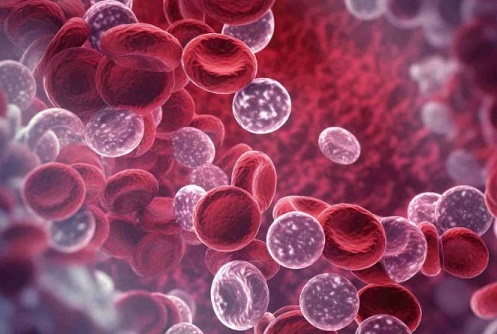Nikhil Prasad Fact checked by:Thailand Medical News Team Jul 24, 2024 8 months, 2 weeks, 6 days, 2 hours, 15 minutes ago
Medical News: Unraveling the Mystery of Blood Microbiota
Italian Scientists from the University of Bari 'Aldo Moro', Istituti Clinici Scientifici Maugeri IRCCS, and eCampus University have embarked on an intriguing journey to explore the presence and role of blood microbiota. Using advanced analytical techniques like real-time PCR, dark field microscopy, and electron microscopy, these researchers have detected bacterial DNA in the blood of healthy individuals. This discovery covered in this
Medical News report, raises questions about the origin and impact of these microorganisms.
 Blood Microbiota Discovered
The Debate on Blood Sterility
Blood Microbiota Discovered
The Debate on Blood Sterility
Traditionally, blood was thought to be a sterile environment, except in cases of infection. However, new evidence suggests that this may not be entirely true. Researchers have detected bacterial ribosomal DNA circulating in the blood of healthy individuals, indicating the presence of a microbiota. Some experts propose that these bacteria might originate from the gut, skin, or even external contamination during blood sampling.
The Role of Blood Microbiota in Health and Disease
One of the most intriguing aspects of this research is the potential link between blood microbiota and various diseases. The presence of certain bacteria in the blood has been associated with cardiovascular, respiratory, hepatic, kidney, neoplastic, and immune diseases. For instance, lipopolysaccharides (LPS) and endotoxins from blood bacteria can cause tissue damage and chronic inflammation, contributing to disease development.
Cardiovascular Diseases and Blood Microbiota
Researchers have found that patients with cardiovascular diseases often have a different composition of blood microbiota compared to healthy individuals. The presence of Gram-positive and Gram-negative bacteria, along with their products like LPS, can exacerbate conditions like atherosclerosis and myocardial infarction. These bacteria interact with immune cells, promoting inflammation and tissue damage.
Respiratory Diseases
Studies on the blood microbiota of patients with respiratory diseases are limited but promising. The presence of bacteria such as Bacteroides and Prevotella has been linked to inflammatory responses in the lungs. In patients with severe respiratory conditions, blood microbiota analysis could potentially help in diagnosing and understanding the underlying microbial interactions.
Hepatic and Kidney Diseases
Blood microbiota may also play a role in liver and kidney diseases. In patients with liver fibrosis or cirrhosis, diverse bacterial species have been detected in the blood. These bacteria can provoke inflammatory responses, worsening the condition. Similarly, in chronic kidney disease, changes in blood microbiota composition have been noted, suggesting a potential role in disease progression.
Cancer and Blood Microbiota
The presence of certain bacteria in the blood can hel
p distinguish different types of cancer and predict treatment responses. For example, specific bacterial profiles in the blood can indicate the presence of colorectal cancer and help assess the effectiveness of immunotherapy. This highlights the potential of blood microbiota as a diagnostic and prognostic tool in oncology.
Autoimmune and Inflammatory Diseases
Autoimmune diseases like systemic lupus erythematosus (SLE) and rheumatoid arthritis (RA) have also been linked to blood microbiota dysbiosis. Elevated levels of specific bacteria in the blood can maintain an inflammatory state, exacerbating these conditions. Understanding the interaction between blood microbiota and immune cells could open new avenues for treating autoimmune diseases.
Mechanisms of Interaction
Blood bacteria interact with host cells, primarily immune cells, through various mechanisms. They can be engulfed by macrophages or bind to T lymphocytes, triggering immune responses. Bacterial products like LPS and extracellular vesicles (EVs) can also activate immune cells, leading to the release of pro-inflammatory cytokines and free radicals. These interactions can have significant implications for health and disease.
Conclusion
The study of blood microbiota is a burgeoning field that holds promise for advancing our understanding of health and disease. Researchers from the University of Bari 'Aldo Moro', Istituti Clinici Scientifici Maugeri IRCCS, and eCampus University have shed light on the potential roles of these microorganisms in various medical conditions. As we continue to explore this fascinating aspect of human biology, the findings could lead to new diagnostic tools, therapeutic strategies, and a deeper comprehension of the intricate relationship between our microbiota and our health.
The study findings were published in the peer-reviewed journal: Hematology Reports.
https://www.mdpi.com/2038-8330/16/3/43
For the latest Bood Microbiota, keep on logging to Thailand
Medical News.
Read Also:
https://www.thailandmedical.news/news/breaking-canadian-study-finds-that-stem-cells-blood-transfusions-and-tissue-transplants-can-transmit-alzheimer-s-disease
https://www.thailandmedical.news/news/breaking-prince-of-songkhla-university-medical-researchers-reveal-concerning-data-on-transfusion-transmitted-infections-in-southern-thailand
https://www.thailandmedical.news/news/breaking-japanese-researchers-warn-about-risks-associated-with-blood-transfusions-from-covid-19-mrna-vaccinated-individuals
